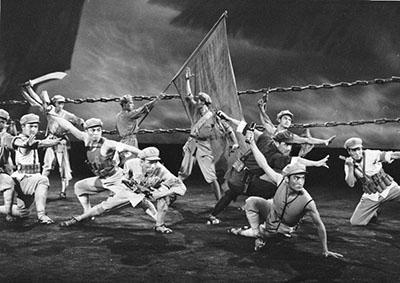Directed by Wang Ping
Though often thought of as the epitome of kitsch, model operas represent a key development in Chinese cinema's tradition of filmed performance, unique both for their extreme ideological rigidity and their mesmerizingly abstract design. While the genre hit its peak during the second phase of the Cultural Revolution, when such films as Xie Tieli's Taking Tiger Mountain by Strategy were the only films permitted in theaters, the form was developed over a number of years. Made during the first stirrings of the Cultural Revolution, and in many ways setting the template for what was to come---not least in the ideological fervor of its hard-line director Wang Ping, one of the very rare women allowed behind the camera during the period---The East Is Red was the most lavish, and most important, of these earlier films; its title song became the unofficial national anthem, and the film itself remained a cornerstone of Mao's cult of personality until his death a decade later. Retelling the history of the Chinese Communist Party, from its founding in 1921 to its victory over the Nationalists in 1949, as a grand musical pageant, The East Is Red is both breathtaking and discomfiting in its monumental design; the opening sequence, for example, with vast numbers of spectators entering the Great Hall of the People, eerily recalls the films of Leni Riefenstahl.
August First Film Studio, Central Newsreel and Documentary Film School.
35mm, color, in Mandarin with English subtitles, 117 min.
Watch a clip from the film below.






 Mobile Navigation
Mobile Navigation

